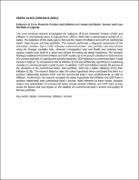| dc.description.abstract | SEERA ALICE (2008-M112-20031)
Influence of Gross Domestic Product and Inflation on Commercial Banks’ Income and Loan Portfolio in Uganda
The cross-sectional research investigated the influence of Gross Domestic Product (GDP) and inflation on the banking sector in Uganda from 1999 to 2009 with a representative sample of 11 banks. The objective of this study was to find out the impact of inflation and GDP on commercial banks’ total income and loan portfolio. The research performed a diagnosis assessment of the individual variables, that is GDP, inflation, commercial banks‟ loan portfolio and total income using the Granger causality tests, Jahansen cointegration tests and finally two ordinary least squares models were built in e-views and utilised for testing the stated hypothesis. The research findings established that both inflation and GDP explain up to 40 percent variations in total income of a commercial bank in Uganda with positive elasticity. GDP elasticity to commercial bank’s total income is high (0.71) compared to that of inflation (0.23) and statistically significant in explaining changes in commercial bank’s total income. In addition, GDP and inflation explain 88 percent of the variations in the commercial banks’ loan portfolio. GDP has a higher elasticity (0.91) than inflation (0.36). The research failed to reject the stated hypothesis hence concluded that there is a positive relationship between GDP and the commercial bank’s loan portfolio/book as well as inflation. Furthermore, the research accepted the stated hypothesis that inflation and GDP have a positive relationship with commercial bank’s income. With reference to these results, decision makers and stakeholders of commercial banks should consider inflation and GDP rates as they assess the factors that may impact on the stability of a commercial bank’s income and quality of the loan portfolio.
Key words: Banks, Commercial, Inflation, Income | en_US |


